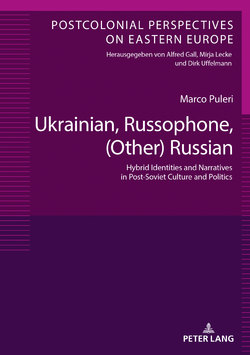Читать книгу Ukrainian, Russophone, (Other) Russian - Marco Puleri - Страница 8
На сайте Литреса книга снята с продажи.
ОглавлениеAcknowledgements
The idea of writing this book first came to my mind when in September 2018 I unexpectedly received an invitation to Berlin to join a workshop on “Russophone Literatures in the Post-Soviet Space” at the Center for East European and International Studies (ZOiS)—that would have then taken place six months later. In her email, Nina Frieß, the coordinator of the project, proposed to discuss the theoretical framework, aesthetics and topics of “Russophonia,” inviting junior and senior scholars with different regional research focuses (i.e. the Baltics, the Caucasus, Central Asia and Ukraine). My surprise—and enthusiastic reaction to the idea behind the project—was motivated by my previous academic experience in “Russophone Studies”: a highly unsystematic and “displaced” research field that first made me revolve around literary studies (namely, “Russian Studies” and “Ukrainian Studies”), and eventually led me to explore the broader cultural, social and political dynamics in Ukraine. To me this was a good sign for the further development of the field, and the long-awaited answer to the “global dispersion” of scholars involved in this extremely challenging research area.
This book reflects almost ten years of research on “Ukrainian Russophonia.” It also incorporates and further develops some outcomes of my first monograph in Italian (Puleri 2016)—which resulted from my PhD in Slavic literatures at the University of Florence (2012–2015)—and other publications in scholarly journals (Puleri 2014; 2017b; 2018) and collected volumes (Puleri 2017a)—where I had the chance to further investigate social and political dynamics in Ukraine as a result of my post-doctoral fellowship (2015–2020) at the Department of Political Sciences of the University of Bologna. I am indebted to the editors for their reprint permission. These contributions have been further revisited in light of the latest social and political developments, and integrated with new research findings, in an attempt to reframe the debate on Ukrainian culture and politics in the broader post-Soviet (and global) struggle for meaning.
I am proud that this volume is part of the pioneering book series Postcolonial Perspectives on Eastern Europe, and I wish first and foremost to thank the series editors for their support, thorough reading of the earlier versions of the manuscript, and insightful comments. Without their help, the volume would have never had its finished shape. In particular, I owe a debt of gratitude to Dirk Uffelmann, who has strongly believed in this book project since my initial proposal, and has patiently followed every aspect of its realization. Special thanks also go to the Institute of Advanced Studies in Köszeg (Hungary), that has generously subsidized and hosted the last stage of my research, and Alessandro Achilli, who has provided extensive and incisive feedback on the final draft of the manuscript.
My own field research and life experience in Simferopol’, Kyiv, L’viv, Kharkiv, Donets’k, Dnipro and Odesa, where I lived for several weeks and months throughout 2010–19, gave me the opportunity to grasp the heterogeneous social and cultural dynamics in Ukraine. As a result of the research fellowship term at the Kyiv-Mohyla Academy (2013), and exchange fellowships at the Ivan Franko National University of L’viv (2018) and at the Odesa I. I. Mechnikov National University (2019), I had the chance to talk with several academics, literary actors and friends, which enriched my knowledge about Ukraine, taking an active part in the search for potential answers to the research questions included in this book. I would like to express my gratitude to them and also to all the people who have shared their insights on the issue in both the academic and extra-academic contexts, in Italy and abroad. Last but not least, I am thankful to Chiara and my family for tolerating the solitary activity of writing and supporting me every step of the way.
